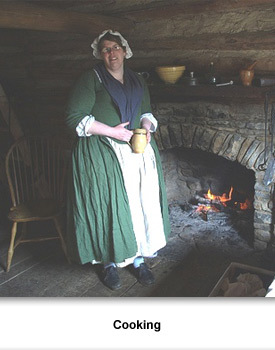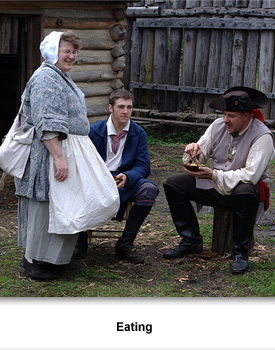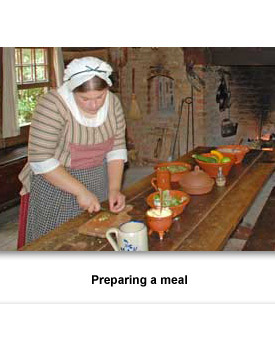Frontier
What They Ate
The typical frontier diet was high in protein (meats). This was because animals could be killed and eaten year around.
Crops had to be planted, tended, and harvested before breads could be made from grain or vegetables cooked. In times of crop failure, pioneers had to rely on animals they could kill for food. Most farmers were skilled enough at hunting to get meat for their families.
Corn and pork were the most common foods on the frontier. Both were easy to produce on the Tennessee frontier.
Pumpkin and squash would be planted among the corn to grow untended. It would then be stored in a root cellar and over the winter served a variety of ways. This included:
· Cooked in a broth
· Roasted over the fire
· Stewed in a soup
· Boiled
· Fried
· Baked
· Preserved in syrup
· Made into bread or cake
· Made into a pie
· Cooked into a butter
One man, writing about pumpkins, said:
I thought that green pumpkins, sliced and fried, about the sweetest eating I ever had in my life.
Foods were served fresh in the spring and summer. Then they were smoked, salted, dried, or pickled for the rest of the year. Items such as coffee, tea, and sugar had to be purchased.
Breakfast was usually a cereal such as corn or oats boiled into a porridge. Much of the food was prepared as a soup or stew with chopped vegetables and meats. The stew would be started in the morning and served for lunch and supper. This would be supplemented by cuts of meat, roasted or boiled, fresh vegetables, and bread.
Drink
Tennesseans drank a variety of liquids, the least of which was water. Although they didn’t know about germs, pioneers knew if they drank water from creeks or the river without heating it—like in coffee or tea—they often became sick. Water from a spring was considered safe, but not everyone had access to good spring water.
Pioneers might also drink coffee, tea, hot chocolate, milk, buttermilk, apple juice, and sweet cider. Coffee, tea, and chocolate were not grown in Tennessee, but were imported. They were available during most of the frontier period.
The most popular drinks among men were those with alcoholic content. This included ale, beer, porter, rum, wine, and whiskey.
On the Tennessee frontier, whiskey was by far the preferred drink. In 1785, in fact, the short-lived State of Franklin listed whiskey as legal tender, meaning it could be used like money. The abundance of firewood and corn needed to distill whiskey helped increase production in the state.
Whiskey was also used as medicine. It would be given to people to kill pain, stimulate breathing, disinfect wounds, and calm them down. One man in 1818 said, “The necessities of life are bread, meat, and whiskey.”

Picture Credits:
- Photograph of a frontier re-enactor eating outside. This photo was taken in 2009 by photographer Robert H. Neidlinger at Mansker’s Station in Goodlettsville, Tennessee. A cabin is shown in the background along with two other re-enactors. Used with Neidlinger’s permission
- Photograph showing a frontier re-enactor cooking inside of a model cabin. This photo was taken in 2009 by photographer Robert H. Neidlinger at Mansker’s Station in Goodlettsville, Tennessee. A table, chair, fireplace and cooking utensils can be seen in the background. Used with Neidlinger’s permission
- Photograph showing a frontier re-enactor eating near the doorway of a wood building. This photo was taken in 2009 by photographer, Robert H. Neidlinger at Mansker’s Station in Goodlettsville, Tennessee. Used with Neidlinger’s permission
- Photograph showing a frontier re-enactor preparing a meal. This photo was taken at the Rocky Mountain Living History Museum in Piney Flats, Tennessee. Rocky Mountain Living Museum
Frontier >> Living on the Frontier >> Everyday Life >> What They Ate




 Sponsored by: National Endowment for the Humanities
Sponsored by: National Endowment for the Humanities